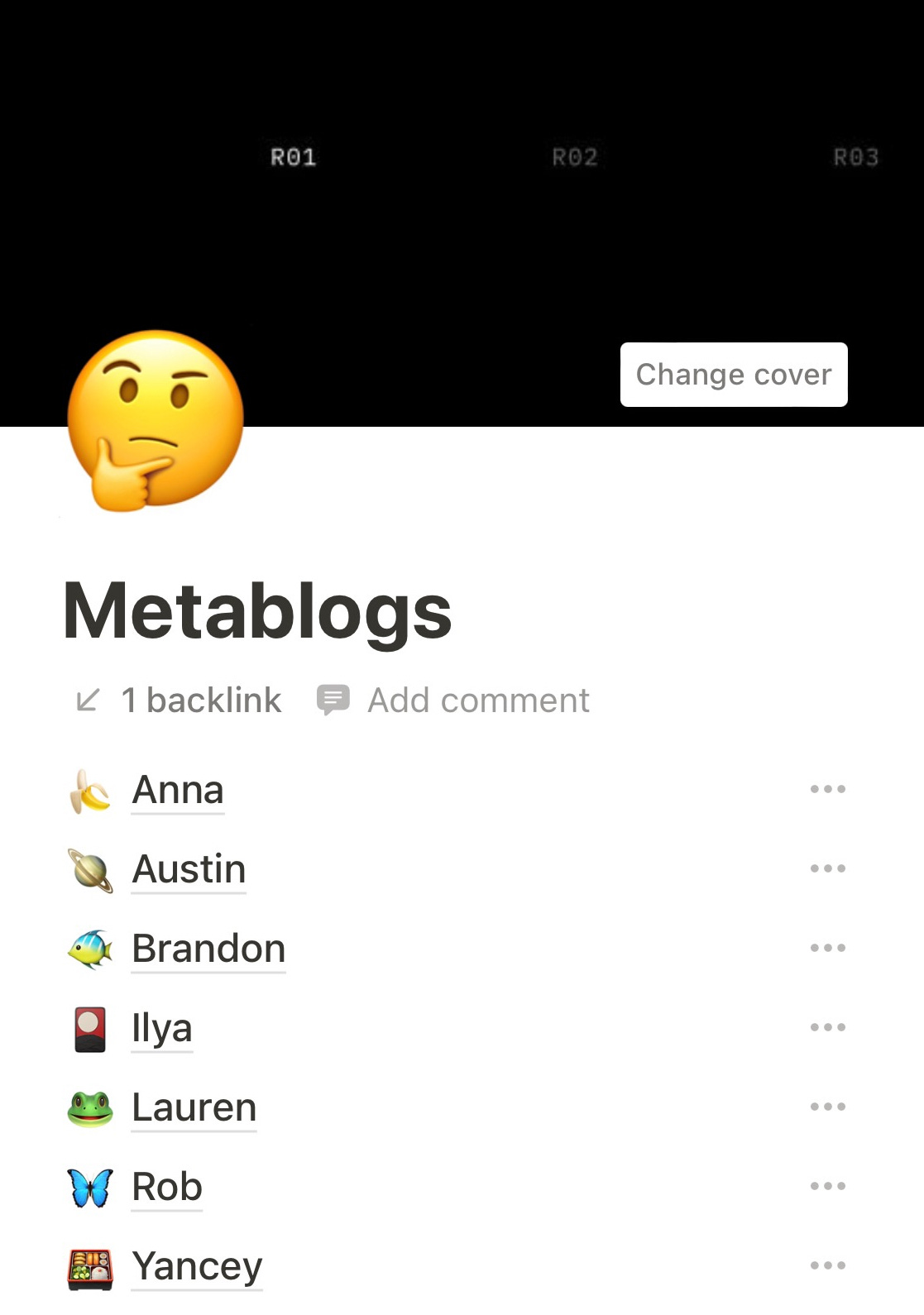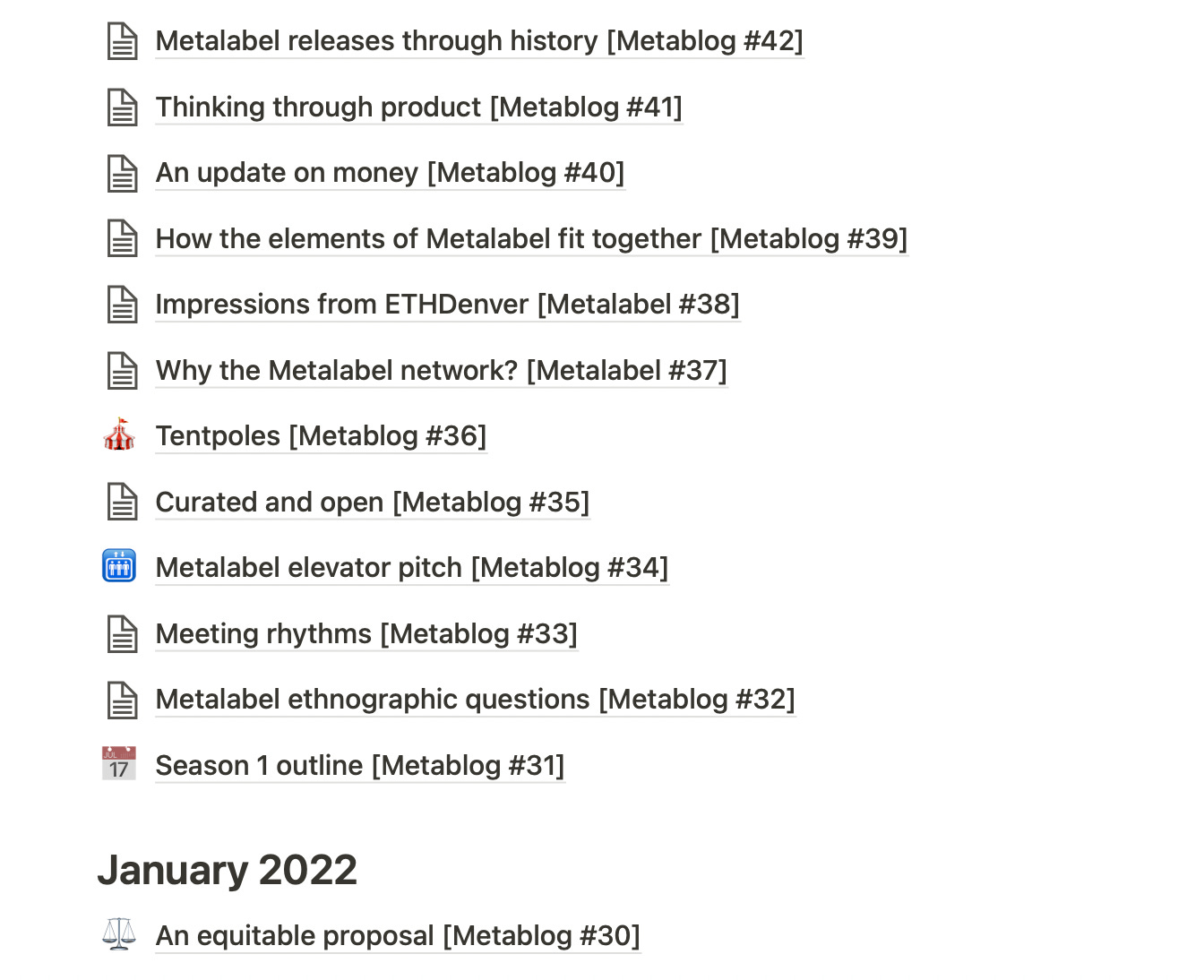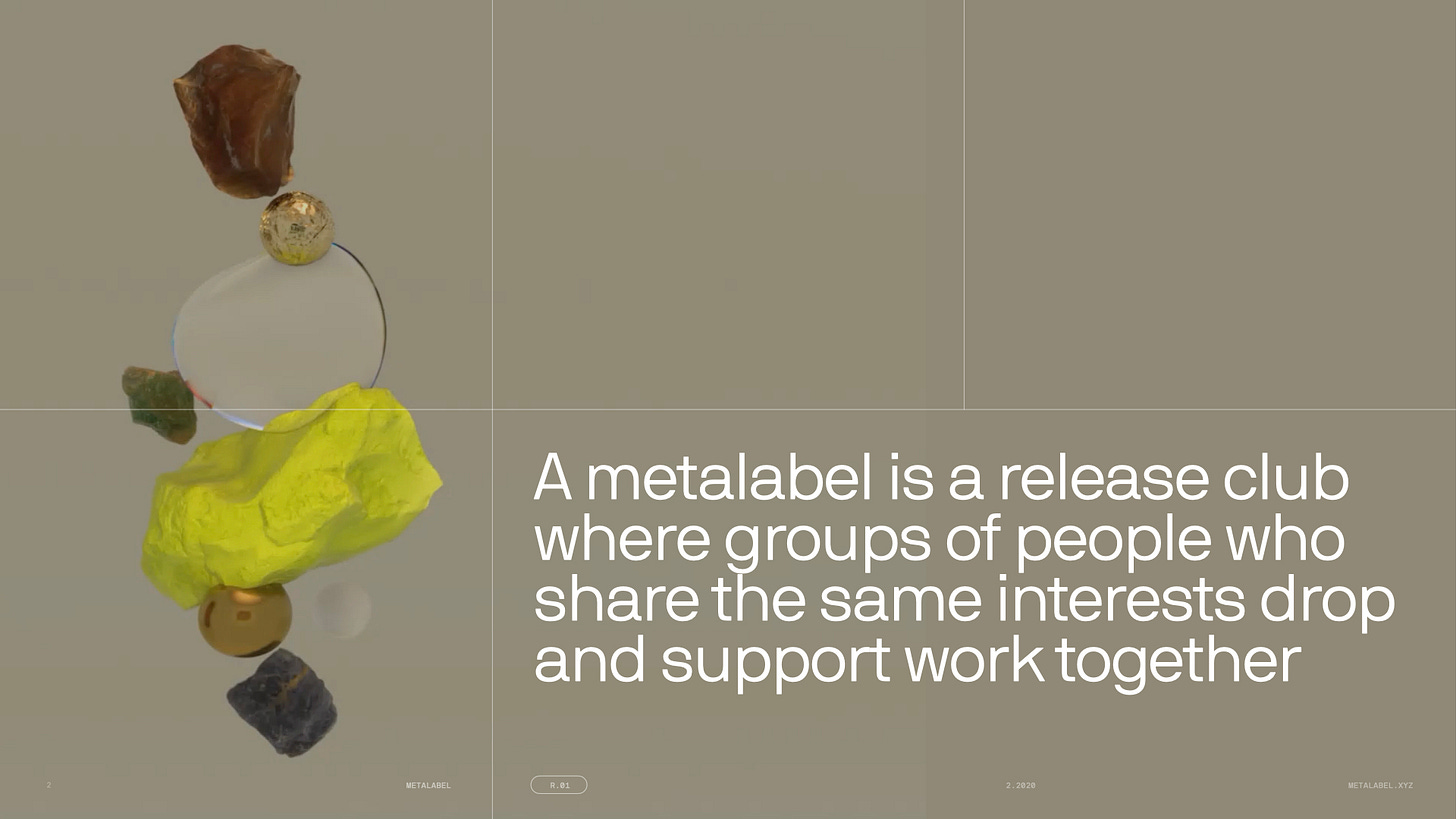Metablogging
How small squads can work faster, more collaboratively, and with fewer meetings by adopting internal public blogs
Sup y’all —
This post explains a practice that’s significantly helped the Metalabel squad over the past year. Hope you and your squads find it useful. ✌️Yancey
Metablogging
One of the key internal rituals we adopted early on at Metalabel is something we call metablogging: internally public blogs written by members of the Metalabel squad detailing what they’re working on and thinking about.
From the start, the group behind Metalabel (Anna Bulbrook, Lauren Dorman, Rob Kalin, Austin Robey, Brandon Valosek, Ilya Yudanov, and myself) has been scattered across the world and timezones, which means our ability to collaborate outside of the small number of hours we can work together is extremely important. In our first core values document we wrote:
We followed through on this commitment. As a group, we began writing frequently, sharing our tasks, our thoughts, and — crucially — commenting and asking questions on each other’s metablogs. Through the posts and comments, core concepts got tighter, language was abandoned and adopted, and decisions were implicitly and explicitly made.
Ten months after starting, there have been more than 200 metablog posts from the seven of us. After all these reps, we’re now discovering the benefits of a metablogging culture, including three especially positive outcomes.
1. Metablogs create transparency around decisions, ideas, and plans
While metablogging we’ve been having deep conversations about what we value, what we believe in, and what we’re building. These conversations aren’t performative — they’re real. We’ve discussed and debated everything from what architecture to use to how to structure equity to who to take money from.
Because posts are internally public you hear from a wider set of perspectives. With more back and forth, the sharper and more holistic ideas become. By thinking openly and engaging with each other’s points of view, we’re pushed to clarify and integrate our thinking and the more trust builds.
2. Metablogs produce a chronological record of past thinking
Metablogs are an open record to retrace how decisions were made and how deeply alternate paths were considered. All our metablogs together is our collective brain.
When our most recent team member joined, they spent their first day reading through all of our past metablogs from the beginning. They described the experience as like learning alongside us, soaking up the lessons and evolutions in our thinking as they happened. This way of onboarding greatly increases the context for a newcomer. They learn what you learned in the order you learned it. They can enter as one of you.
3. Metablogs reduce meetings
Most surprisingly, metablogs reduce meetings.
When I look at the things we blog about — how to structure ourselves, what tech stacks to use, architectural and design decisions — all of these would be meetings in a typical organization. Not just one meeting, but a series of them as stakeholders would debate the topic, probably not finding an immediate resolution, then bringing more people into the discussion (yet still likely excluding key voices for logistical reasons just as much as hierarchical ones). The meetings would be endless.
We still have live conversations and debates about all of these things, but the real work of thinking things through and coming to consensus happens via metablogs where everyone can process and reflect at their own pace.
Metablogs have also become a way to announce work that’s already underway without explicitly needing or asking for approval based on assumed consensus.
When we started building the core Metalabel product (coming later this year) there was no official kick-off meeting. Work just… started. The build team updates the full squad on progress, key decisions, and choices via metablogs, and others comment and ask questions back. There is a weekly product meeting where we discuss project status, but most of the deep thinking and collaborative work happens in metablogs. Because we’re all participants in the conversation, we’re aware of where there’s consensus and where there’s not. The team doesn’t need to stop building or wait for a decision to be made while discussions occur.
Compare this to a traditional org. In that setting, the product and dev teams have to make a presentation that pitches the scope of what’s being built to the CEO and other stakeholders. That meeting would become a negotiation as stakeholders fought for their technical needs. Once this was decided (over multiple meetings), the product and dev teams would have to stick to the plan as dictated to them and create a waterfall that must result in hitting deadlines and KPIs. Or else.
The corporate path definitely has a lot more predictability and control. But structures built around a need for control can deeply conflict with processes that produce meaningful creative work.
Metablog all the things
Metablogging is something any team can and should do. Our setup is very basic:
We each have our own folder in Notion to host our metablog
There’s a Discord channel where we announce when we’ve made a new post
That’s it
The simpler the tech the better. You don’t want metablogging to require a lot of effort. You want it to be a seamless default that pulls ideas into your group’s internally public ideaspace to see what connections they create.
As I’ve come to see it, there are two paths for how groups can communicate:
Information hierarchies, which create closed doors; corporate onboarding; individuals choosing what info to share; and lots of meetings
Metablogging, which creates transparent discussions; first-person POV onboarding; open information; and few meetings
A year into metablogging, we’re learning first-hand how an open information infrastructure allows for new forms of post-permission collaboration. By building our work on a foundation of curiosity, openness, and trust, we’ve found ourselves with stronger connections, firmer ideas, and a sense of joy in our work together.
Metablogging doesn’t do this on its own. But it does create a strong foundation of trust that will help any squad fulfill whatever purpose calls them together.
Thanks to my squadmates Anna Bulbrook, Lauren Dorman, Rob Kalin, Austin Robey, Brandon Valosek, and Ilya Yudanov for sharing in this experiment <3
Tweeting in multiplayer mode
Metalabel and the excellent Trust Support recently collaborated to drop CHORUS, an open source bot that lets groups collectively tweet by upvoting posts in Discord.
Metalabel’s Twitter account, for example, is now controlled by 140 people writing and upvoting each other on what we should tweet (follow us (and I do mean us) here).
CHORUS is our fourth drop and our first collaboration with another group. It’s also a tangible example of what we mean when we talk about shifting from creating in single-player mode to multiplayer mode. Learn how to use CHORUS with your community here.
Metalabels IRL
Metalabels aren’t theoretical. They already exist.
We recently ran a five-week experience called ASSEMBLY for a cohort of 39 metalabels from around the world. They included:
Songcamp, a collective of 100+ musicians who design creative constraints to produce work together and who got a Billboard hit with their latest release
Extinction Rebellion, a global activist group that creates mass acts of civil disobedience to stop climate change
NRMAL, a music festival and community in Mexico exploring the frontiers of community participation and empowerment
Atoms.org, a metalabel supporting new approaches to scientific research
Botto, a community collectively governing an AI-generated art practice
PactDAO, a NYC-based mutual aid collective bringing material benefit to neighbors and local community
Read bios of all ASSEMBLY participants in this Twitter thread
In each of these projects groups of people are coming together to create and support work around a shared interest, making something bigger and more impactful than what they could on their own.
This fall our universe will significantly expand with more tools and resources for metalabels. Stay updated on future drops here.
Reflections from FWB Fest
This past weekend I attended FWB Fest by the social DAO Friends With Benefits at an arts high school campus in the beautiful mountains of Southern California. The event was excellent, but raised some interesting questions about the future of DAOs. Click to read a post sharing ten reflections from the first Friends With Benefits Festival.
A new mix
Finally, it’s been a while since I’ve shared music. Here’s a new mix for you. Tracklist:
01 Alice Coltrane, “Ptah, the El Daoud”
02 Tonstartssbandht, “5ft7”
03 Drake, “Texts Go Green”
04 Fela Kuti, “Noise for Vendor Mouth”
05 Kendrick Lamar, “United in Grief”
06 Liars, “It Fit When I Was a Kid”
07 Bob Marley & The Wailers, “Rastaman Chant”
08 Domenique Dumont, “Le soleil dans le monde”
09 Kurt Vile, “Mount Airy Hill”
10 Sam Gendel, “Waraku3”
11 Sun Ra, “Sleeping Beauty”
12 Don Cherry, “Butterfly Friend”
13 Laurie Spiegel, “Patchwork”
14 The Strokes, “Call it Fate, Call It Karma”
Listen to INSPO on Apple Music/Spotify
Peace and love y’all,
Yancey










My enthusiasm in reading about metablogging is obviously biased by the fact that I've always loved writing (and drawing) since I was a kid and I kept doing it, they are a big part of how I communicate but...that's not the case for most other people I've worked and continue working with.
It happens more dramatically with drawing, but my take is that even for writing there is, at some point, a breaking point where most people quit writing, or quit writing properly and functionally, as much as they quit drawing earlier in life.
Good writing is the foundation or proper asynchronous and distributed work but most companies I work with are on the opposite side of the spectrum: they don't even read or reply to emails because they are always in meetings. Metablogging would be science fiction for them!
I wish there was an easy way to break the vicious cycle of over-reliance on synchronous meetings, but I'm afraid I would have to start by teaching people how to write (again)...